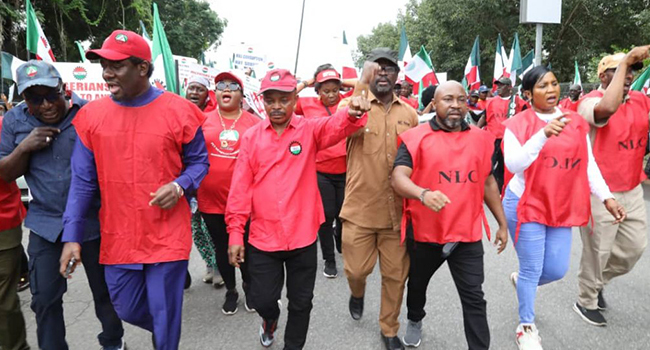Nigeria
NLC Orders Nationwide Strike Over Non-Implementation of Minimum Wage

The Nigeria Labour Congress (NLC) has directed its members to proceed on a nationwide strike in protest of the government’s failure to implement the minimum wage. Learn more about the strike and its potential impact.
The Nigeria Labour Congress (NLC) has instructed its members in states that have not yet started implementing the new minimum wage to begin an indefinite strike starting December 1, 2024.
The directive stems from the resolutions made by the NLC following its National Executive Council (NEC) meeting over the weekend.
The NEC expresses deep frustration over the continuous delays and outright refusal by
Several state governments are set to implement the 2024 National Minimum Wage Act. This decision by certain governors and government officials across the country reflects a blatant betrayal, undermining both legal standards and ethical principles as workers remain deprived of their rightful wages amidst increasing economic challenges. It demonstrates clear disrespect for the law and disregards millions of Nigerian workers’ lives, who continue to be exploited by leaders pledged to safeguard them.
The NEC has decided to establish a committee for the implementation of a National Minimum Wage.
A committee that will, among other tasks, initiate a nationwide assessment.
campaign for mobilization and awareness, aimed at educating workers and citizens about the
must stand firm against this attack on their dignity and rights. Additionally, the NLC will
begin a series of industrial actions in all non-compliant states and will persist until the minimum wage is fully implemented throughout Nigeria.
To achieve this, all state Councils where the National Minimum Wage has not been
fully implemented by November 30, 2024. They have been instructed to commence a strike starting December 1, 2024. “Nigerian workers demand justice, and justice they shall receive,” stated the NLC communique in part.
At the same time, the NLC has accused petroleum marketers of artificially raising petrol pump prices, claiming they are significantly above its true market value.
The NLC claims that petrol marketers are taking advantage of Nigerians and exacerbating the existing hardship caused by the government’s stringent economic policies.
READ ALSO: NLC Supports NUPENG’s Nationwide Strike Threat Over Allegations Against Military
The NEC meeting expressed growing disappointment with the ongoing antics surrounding the
fair pricing of petrol (PMS) in Nigeria. It noted potential collusion among industry elites, as the current price is significantly above the true market value.
It appears that inflated costs and unusual profit margins are prevalent, as suggested by the ongoing dispute between Marketers and the Dangote group. It is quite likely that Nigerian workers and citizens are being exploited by those who wield economic power in Nigeria. This could explain why domestic public refineries might not be allowed to become operational immediately.
The NLC insists on fair pricing for petrol and appeals to the public.
The refineries in PH, Warri, and Kaduna are set to resume operations promptly.
the dominant control that major companies exercise over the industry.
Regarding the deteriorating economic situation in the country, the NLC stated that its NEC is deeply concerned about the escalating financial difficulties.
imposed on Nigerian citizens.
It highlighted that inflation is persistently increasing without restraint, causing the prices of essential goods to escalate beyond what the average worker and others can afford.
The NLC called for prompt and substantial actions from the Federal Government, rejecting superficial measures, to alleviate this suffering.
We advocate for the introduction of comprehensive social protection policies to safeguard Nigerians from poverty, offer affordable healthcare, and establish wages that accurately reflect the cost of living. To achieve this, we urge a nationwide wage review along with an assessment of current policies that have disadvantaged Nigerian citizens.
